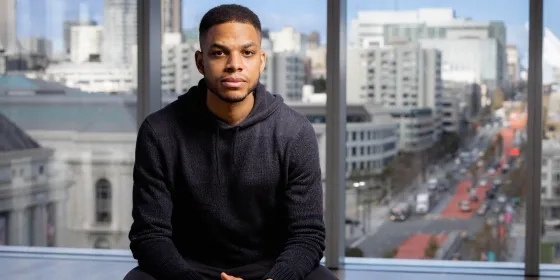Composer Jonathan Bingham on the EBCP, his Creative Process, and Moving to SF
Emerging Black Composers Project prize winner Jonathan Bingham sits down with the SFCM newsroom on how his life has changed and what’s next for his debut.
By Mark Taylor
San Francisco has a notable new resident. Composer Jonathan Bingham recently relocated to the city by the Bay after being selected as one of the prize winners of the Emerging Black Composers Project, “It’s just as much of a surprise to me as anyone!” Bingham said. He had been living in Los Angeles, but during the pandemic had moved back to his hometown in New Jersey. After being selected he decided to make the move, “The project seemed like a great opportunity for everyone involved but a greater opportunity if I could compose in the same city as its facilitators,” he added.
Over the last decade, Bingham has composed music for more than a dozen film scores, advertisements, and received commissions to write for numerous ensembles. With the EBCP his work will debut with the National Brass Ensemble at Davies Symphony Hall in a special June performance. “I couldn’t be happier. I’m thrilled to get the chance to contribute to brass literature. To take this on, I can’t think of a better group to work with than NBE, which is made up of some of the best players in the world.”
The Emerging Black Composers Project is a ten-year commitment to spotlight early-career Black American composers and their music. It was launched in 2020 with the first-place commission given in June of 2021 to Trevor Weston. Weston won a $15,000 commissioning fee for an orchestral work to be performed by the San Francisco Symphony in 2022. Thanks to a gift by Michèle and Laurence Corash, Bingham was one of three $8,000 additional prize winners whose compositions will debut with the Oakland Symphony or National Brass Ensemble.
According to Bingham, he was motivated to apply to get his work noticed any way he can, “I no longer set the goal to win such competitions. I choose to go forth with the cognition that supports applying, not to win, but to get my music heard. Once the ‘submit’ button is clicked, it’s a guarantee someone is going to listen to the music and have a cognitive response to it, which is the obvious reason for composing in the first place,” he said.
Growing up, Bingham calls himself an “Instrumentalist” playing piano, trumpet and percussion, but didn’t want to make it a career until high school, “A music tech class assigned students to make music to silent films using MIDI keyboards. This sparked my interest in production and the recording arts until, during my college sophomore year, I found myself listening to orchestral film scores reminding me of what I had done in the music tech class. I began studying composition afterward.” Bingham now holds degrees in composition from Howard University and New York University.
Bingham’s work has been recognized for its use of electronic and acoustic instrumentation. This unique creative process is something he will keep in creating this new composition, “I’m planning to have structure play just as important of a role, if not more important, as the sonic elements of music: harmony, rhythm, melody. Additionally, I’ve been reading up on music that has made a lasting impact on audiences due to finding the balance between novelty and convention. I want the piece to have unfamiliarity while still being relatable. It sounds like a contradiction but I’ve found this point existing in other music and to be vital in making an influence sonically.”
Just before his move to San Francisco, Bingham had started a new initiative to record the music of composers associated with his alma mater Howard University with a project called Cool Story. “I want to give a thank you to SFCM and EBCP for, not only the NBE commission, but also for offering support to the recording,” Bingham added.
To other emerging composers Bingham emphasizes that winning is not everything, but getting your work heard often is, “Many of our industry’s rising composers are getting recognition because they put their work on a stage before getting commissioned. Although your self-achievements may be on a smaller scale, (scale size doesn’t matter), they will propel any career forward long term,” he said.
The Emerging Black Composers Project is open and taking applications until February 14th, 2022. Winners will be announced in spring 2022.
